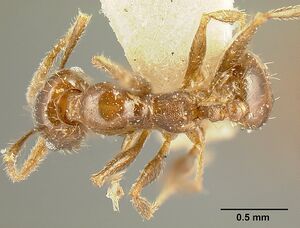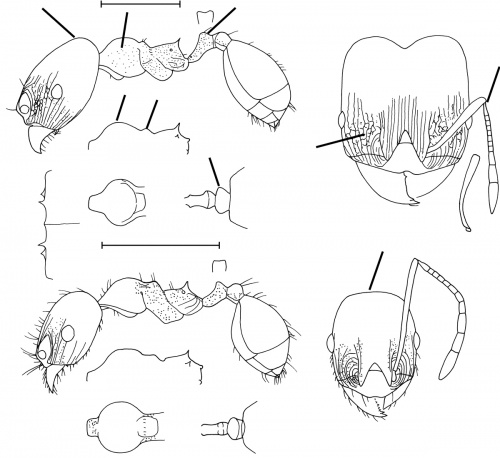Pheidole maja
| Pheidole maja | |
|---|---|

| |
| Scientific classification | |
| Kingdom: | Animalia |
| Phylum: | Arthropoda |
| Class: | Insecta |
| Order: | Hymenoptera |
| Family: | Formicidae |
| Subfamily: | Myrmicinae |
| Tribe: | Attini |
| Genus: | Pheidole |
| Species: | P. maja |
| Binomial name | |
| Pheidole maja Forel, 1886 | |
Nothing is known about the biology of maja.
Identification
See the description in the nomenclature section.
Keys including this Species
Distribution
Only known from the type locality.
Latitudinal Distribution Pattern
Latitudinal Range: 14.613° to 14.613°.
| North Temperate |
North Subtropical |
Tropical | South Subtropical |
South Temperate |
- Source: AntMaps
Distribution based on Regional Taxon Lists
Neotropical Region: Guatemala (type locality).
Distribution based on AntMaps
Distribution based on AntWeb specimens
Check data from AntWeb
Countries Occupied
| Number of countries occupied by this species based on AntWiki Regional Taxon Lists. In general, fewer countries occupied indicates a narrower range, while more countries indicates a more widespread species. |

|
Estimated Abundance
| Relative abundance based on number of AntMaps records per species (this species within the purple bar). Fewer records (to the left) indicates a less abundant/encountered species while more records (to the right) indicates more abundant/encountered species. |

|
Biology
Castes
Worker
Minor
Images from AntWeb
   
| |
| Paralectotype minor Pheidole maja. Worker. Specimen code jtlc000015319. Photographer John T. Longino, uploaded by California Academy of Sciences. | Owned by MHNG. |
Nomenclature
The following information is derived from Barry Bolton's Online Catalogue of the Ants of the World.
- maja. Pheidole maja Forel, 1886b: xlviii (s.w.q.) GUATEMALA. See also: Wilson, 2003: 322.
Unless otherwise noted the text for the remainder of this section is reported from the publication that includes the original description.
Description
From Wilson (2003): A member of the fallax group somewhat similar to Pheidole chiapasana, Pheidole dentata, Pheidole humeridens, Pheidole industa, Pheidole laevivertex, Pheidole madrensis, Pheidole tetroides, distinguished as follows.
Major: very sparse pilosity, with no hairs on full-face profile (types may be degraded); head elliptical in profile, narrowing conspicuously in side view; in dorsal-oblique view, pronotal profile smoothly convex; petiolar node in side view low; postpetiole from above trapezoidal; sides of pronotum sparsely foveolate.
Minor: occipital margin in full-face view convex; carinulae present along lateral margins of frontal lobes.
MEASUREMENTS (mm) Lectotype major: HW 1.22, HL 1.30, SL 0.80, EL 0.22, PW 0.62. Paralectotype minor: HW 0.62, HL 0.74, SL 0.82, EL 0.14, PW 0.44.
COLOR Major: concolorous light reddish brown.
Minor: concolorous plain medium brown.
Figure. Upper: lectotype, major. Lower: paralectotype, minor. Scale bars = 1 mm.
Type Material
GUATEMALA: Ciudad de Guatemala. Musee d'Histoire Naturelle Genève and Museum of Comparative Zoology - as reported in Wilson (2003)
Etymology
Possibly Gr maia, good mother, nurse. (Wilson 2003)
References
- Forel, A. 1886b. Espèces nouvelles de fourmis américaines. Ann. Soc. Entomol. Belg. 30:xxxviii-xlix. (page xlviii, soldier, worker, queen described)
- Wilson, E. O. 2003. Pheidole in the New World: A dominant, hyperdiverse ant genus. Harvard University Press, Cambridge, MA. (page 322, fig. major, minor described)
References based on Global Ant Biodiversity Informatics
- Kempf, W.W. 1972. Catalago abreviado das formigas da regiao Neotropical (Hym. Formicidae) Studia Entomologica 15(1-4).
- Wilson, E.O. 2003. Pheidole in the New World: A Dominant, Hyperdiverse Genus. Harvard University Press



